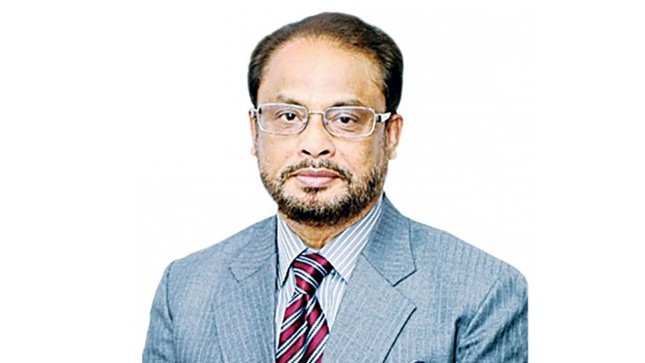2 Killed, over 40 hurt as RMG workers clash with police
Russel’s coworkers alleged that he was shot dead by police, which the police did not confirm
At least two people were killed and about 40 injured in massive clashes between police and ready-made garment workers in several industrial areas in Ashulia, Savar, and Gazipur today. Several police officers were also injured in the clashes.
One of the deceased is Russel Hawlader, 25, an electrician at the Design Express Limited, who was shot dead during a clash in Gazipur. But the identity of the other deceased is still unknown.
Russel’s coworkers alleged that he was shot dead by police, which the police did not confirm.

Garment workers have been protesting for a week demanding a minimum wage of Tk23,000, despite efforts by the government, workers’ leaders, and owners’ associations to normalise the situation.
On Monday, workers blocked roads, set fire to vehicles and vandalised factories in various areas. When police tried to remove them from the road, the protest turned into a clash. Police fired tear gas, rubber bullets, and live ammunition to control the situation, according to eyewitnesses.
Russel Hawlader hailed from Jhalakathi sadar upazila, Inspector Bachchu Mia, in-charge of the Dhaka Medical College and Hospital (DMCH) police outpost, told The Business Standard.
Superintendent of Gazipur Industrial Police Md Sarwar Alam confirmed that Russel was shot, but could not say who carried out the shooting.
“The industrial police are not responsible for the shooting. However, we do not know if the metropolitan police could be involved in this connection,” he said.
Meanwhile, the Gazipur Metropolitan Police issued a statement stating that the Tairunnessa Memorial Medical College and Hospital informed the Gacha Police Station that Russel was admitted to their hospital with a cardiac arrest. They later referred Russel to Tongi Hospital for better treatment, and that hospital then sent him to Dhaka Medical College Hospital. Russel died on the way.
One of Russell’s colleagues Abu Sufian told TBS that he and Russell Howladar lived in the same house and worked in the same garment factory.
He said that Russell had been rescued with bullet wounds and first taken to Ahsanullah Master Medical College and Hospital in Tongi. He was then taken to Dhaka, where he died.
The police claimed that the workers vandalised nearby buildings and factories, and torched various buses and vehicles in the area.
Abu Siddique, officer-in-charge of Basan Police Station, told the media that the agitated garment workers took to the streets early in the morning and ended up creating chaos.
“They torched a police car in front of the Columbia Garments factory. Later, locals and fire service personnel went to the spot and doused the fire.”
He also said the mayhem caused disruption to the traffic on the Dhaka-Mymensingh and Dhaka-Tangail highways.
Talking with local journalists Gazipur Metropolitan Police (GMP) South Deputy Commissioner (Detective) Mohammad Ibrahim Khan said, “We fired tear gas, rubber bullets and bullets to control the situation. It is not certain whether Russell was killed in the shooting or other reason. We will be sure after investigation.”
Earlier on Monday, at least 26 were injured during a clash in the Next Collection factory of Hamim Group in Ashulia.
The incident took place as some alleged workers entered the factory and clashed with the factory staff.
Some 14 others were injured in clashes in Gazipur, according to sources.
On 21 October, readymade garments factory workers demanded that their minimum wage be increased from the existing Tk8,000 to Tk20,390 while the owners have proposed to increase it to Tk10,400.
BGMEA tries to control the situation
Meanwhile, the Bangladesh Garment Manufacturers and Exporters Association (BGMEA) discussed with trade union leaders and law enforcement agencies to try to control the situation. The apex body has also called a press briefing on Tuesday at its Dhaka office.
Seeking anonymity, a senior industrial police official told The Business Standard that the violence on Monday was more severe than on previous days, even though the workers had been protesting for a week.
The official said that it was difficult to confirm how many factories and vehicles were vandalised in the clash, as the protests were still ongoing in several areas. He confirmed that the strike and protests were limited to Gazipur, Savar, and Ashulia.
BGMEA President Faruque Hassan mourned the death of the RMG worker and said, “BGMEA has held several meetings with worker leaders to normalise the situation. We don’t want any strikes or casualties, as workers are our lifeline.”
Adding that BGMEA is committed to increasing salaries decently and that the increase will be effective from this December, Faruque said, “We have asked our members to stop factory operations in the event of a security crisis. But many culprits, whom I believe are not our workers, are vandalising factories, even after they have been closed.”
“Many factories have already shut down due to the strike,” he said, “and buyers are afraid to visit Bangladesh, let alone place orders. Factory owners are also feeling insecure.”
Workers’ wages will be higher than factory owners’ proposal: Labour minister
The minimum wage for ready-made garments workers would be set higher than that proposed by the factory owners, said State Minister for Labour and Employment Begum Monnujan Sufian.
In a ministry statement on Monday evening she urged the agitated workers to return to work and not be confused by anyone’s words.
“There is a meeting of the Minimum Wage Board on 1 November. The parties concerned will discuss these issues there and wages will be fixed by 30 November,” said the minister.



















